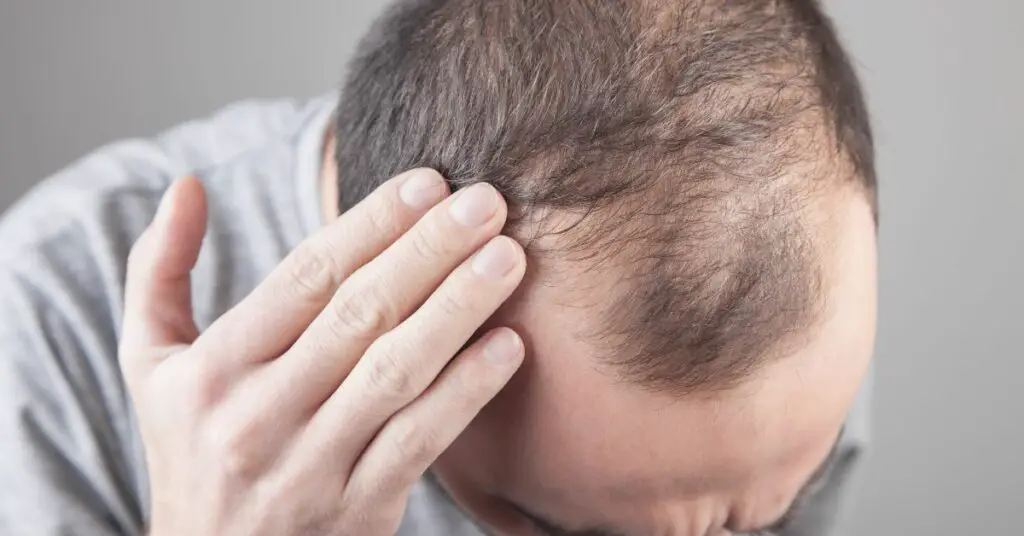When it comes to hair loss, there are many possible causes – from genetics to stress. And while there’s no surefire way to prevent hair loss entirely, some research suggests that meditation may help.
Meditation is a practice that involves focusing the mind on a particular object or thought in order to achieve a state of calm and relaxation. Some people use meditation to reduce stress and anxiety, and it’s thought that this may be one reason it might help with hair loss.
In this article, we’ll explore the potential link between meditation and hair loss and some of the other benefits of meditation.
What is Hair Loss?
Hair loss is the partial or complete loss of hair from the head or body. Hair loss can affect just the scalp or all over the body. It can be temporary or permanent and can be caused by a variety of factors.
Hair loss, also known as alopecia, is the condition of having no hair on the head. The most common form of baldness, androgenetic alopecia (AGA), is characterized by a receding hairline and thinning hair on the crown of the head. This type of hair loss is usually caused by genetics and hormones.
What Are The Causes of Hair Loss?
Hair loss can have many different causes. It can be the result of,
-Hormonal imbalances
-Medical conditions
-Genetics
-Certain medications
-Poor nutrition
-Stress
-Autoimmune diseases
If you are worried about hair loss, it is important to see a doctor to find out the cause.
There are many different types of hair loss. The most common type is male pattern baldness, which affects around half of all men by the time they are 50. Other types of hair loss include female pattern baldness, alopecia areata and telogen effluvium.
Male pattern baldness is usually caused by a combination of genetics and hormones. The condition is thought to be passed down from generation to generation.
If you are experiencing hair loss, it is important to speak with a doctor to determine the underlying cause. Treatments for hair loss will vary depending on the cause.
How Can Meditation Help to Prevent Hair Loss?
Meditation has long been touted for its many health benefits, including reducing stress, improving sleep and increasing focus. But did you know that meditation can also help to prevent hair loss?
While there is no cure for baldness, meditation can help to reduce stress levels, which can, in turn, help to prevent hair loss. When we are stressed, our bodies produce the hormone cortisol, which can lead to hair loss. By reducing stress levels through meditation, we can help to reduce the amount of cortisol in our bodies and prevent hair loss.
In addition to reducing stress, meditation can also help to improve circulation. Good circulation is essential for healthy hair growth, as it delivers nutrients and oxygen to the hair follicles. Meditation can help to improve circulation by increasing blood flow to the scalp.
So, if you’re looking for a natural way to prevent hair loss, try meditation!
Tips For Meditating to Improve Hair Health
1. Prepare your space. Make sure you have a comfortable place to sit or recline. You may want to use a pillow or blanket to support your back. You may also want to play soft, relaxing music to help you focus.
2. Close your eyes and take a few deep breaths. Focus on your breath as you inhale and exhale slowly.
3. Repeat a mantra. A mantra is a short, positive phrase that you can repeat to yourself during meditation. For example, you might say, “I am healthy, and my hair is strong”, or “I am at peace with myself and my hair.”
4. Visualize your hair goals. See yourself with the healthy, strong hair you desire. Visualize your hair growing longer, thicker, and healthier with each breath you take.
5. Accept whatever thoughts come into your mind. Don’t try to push them away. Just let them float by like clouds in the sky.
The Best Time of Day to Meditate For Hair Growth
There’s no one “right” time to meditate for hair growth. However, some times of the day may be better than others, depending on your schedule and what works best for you.
Some people find that meditating in the morning helps them start their day with a sense of calm and focus. Others prefer to meditate in the evening as a way to wind down and relax before bed.
Whichever time of day you choose to meditate, the key is to be consistent and make it a part of your daily routine. Meditation can be a great tool for promoting hair growth, but it’s only effective if you stick with it.
Other Benefits of Meditation
In addition to promoting hair growth, meditation offers a host of other health benefits.
Meditation can help to reduce stress, improve sleep, and increase focus. It can also help to lower blood pressure, improve heart health, and boost immunity. Meditation has even been shown to slow the aging process!
So, if you’re looking for a way to improve your overall health and well-being, meditation is a great place to start.
Frequently Asked Questions Related to Meditation And Hair Loss
1. Can you regrow hair through meditation?
Mindfulness and meditation can be used to promote hair growth.
There are a few possible explanations as to why this might work. One possibility is that when we’re stressed, our body releases a hormone called cortisol. Cortisol has been shown to inhibit hair growth. Mindfulness and meditation may help reduce stress and cortisol levels, promoting hair growth.
2. Can hair fall due to stress?
Hair fall can be caused by stress. When you’re stressed, your body releases a hormone called cortisol. Cortisol can cause your hair to fall out.
There are other things that can cause hair to fall out, such as hormonal changes, vitamin deficiencies, and certain medications. If you’re concerned about your hair loss, it’s best to talk to your doctor.
3. Can hair roots regenerate?
Your hair follicles can repair themselves after an injury, and your hair will grow back. If you are balding, your hair follicles are still alive and can still produce new hairs.
The best way to prevent or reverse hair loss is to keep your scalp healthy by using gentle shampoos and conditioners and avoiding harsh chemicals, tight hairstyles, and excessive scratching.











